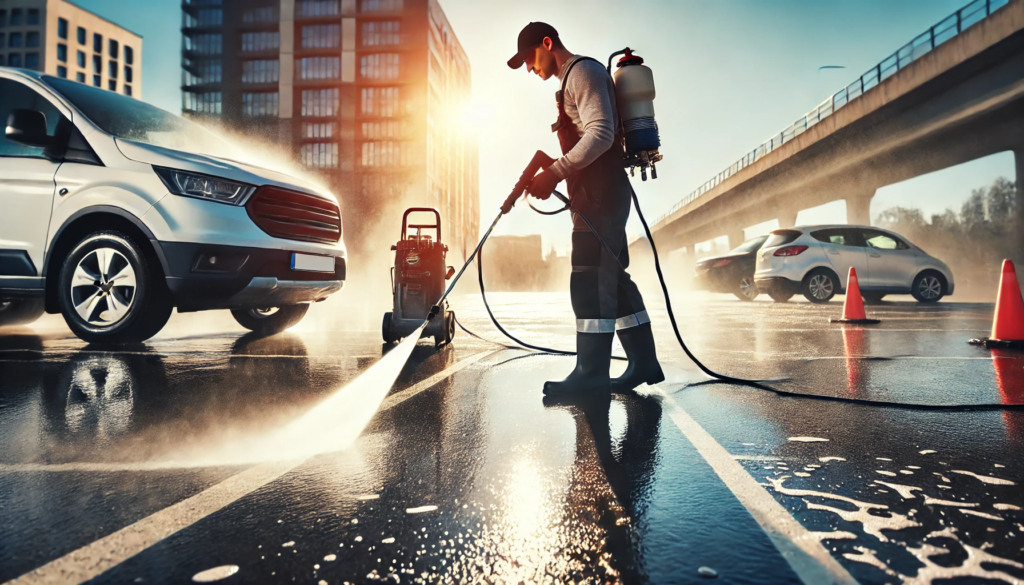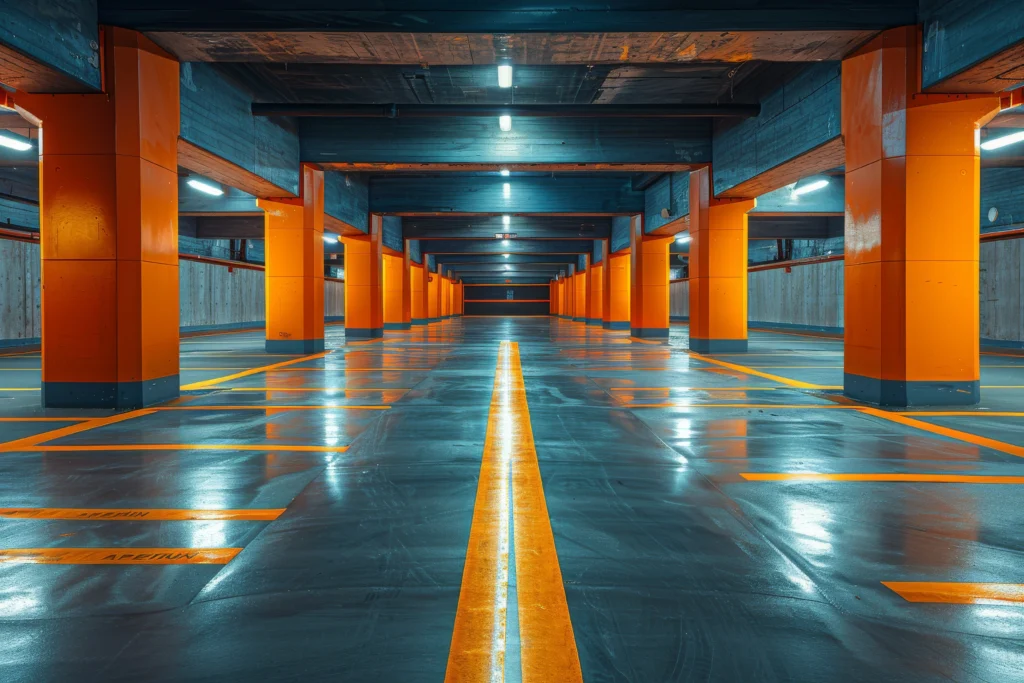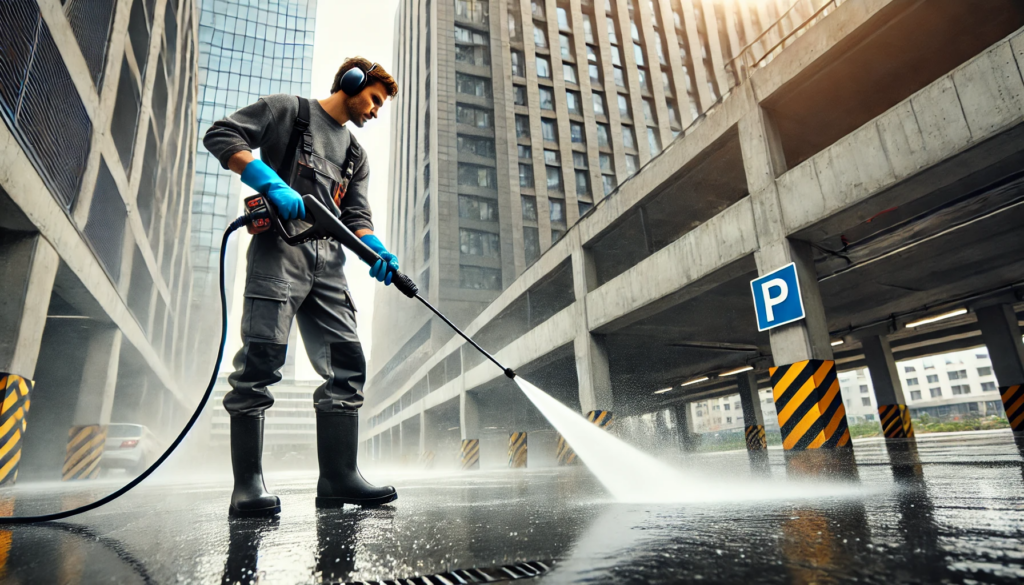
Parking lots are more than just spaces for vehicles—they are extensions of your business or property. A clean and well-maintained parking lot reflects professionalism, builds trust, and ensures the safety of visitors. Among the most critical safety concerns for parking lot owners is preventing slip and fall accidents, which can lead to serious injuries and costly liabilities. One of the most effective ways to address this issue is through routine pressure washing.
This blog explores how pressure washing mitigates slip and fall hazards in parking lots, highlighting its role in maintaining cleanliness, safety, and peace of mind for property owners and users alike.
Common Slip and Fall Hazards in Parking Lots
Parking lots are exposed to the elements and frequent foot and vehicle traffic, making them susceptible to accumulating dirt, grime, and slippery substances. The most common hazards include:
- Oil and Grease Spills:
Leaks from vehicles can create slick spots that are invisible to the untrained eye but highly hazardous to pedestrians. - Moss, Mold, and Algae Growth:
Damp and shaded areas in parking lots are breeding grounds for slippery organic growth. - Weather Debris:
Rain, snow, and ice leave behind mud, wet leaves, and other residues that can cause slips. - Litter and Spills:
Trash, food, and drink spills not only detract from the property’s appearance but also increase the risk of accidents.
The Role of Pressure Washing in Hazard Prevention
Pressure washing is a powerful cleaning technique that uses high-pressure water to remove stubborn dirt, grime, and other materials from surfaces. When applied to parking lots, it effectively eliminates many of the substances that contribute to slip and fall accidents.
1. Removing Oil and Grease
Pressure washing is particularly effective at breaking down and removing oil and grease spills that accumulate in high-traffic areas. Specialized detergents can be used to lift these slick substances, restoring the pavement to a safe and clean condition.
2. Eradicating Organic Growth
Moss, algae, and mold thrive in damp conditions, creating slippery surfaces that are dangerous for pedestrians. Pressure washing eliminates these growths at their root, ensuring the pavement remains safe and slip-resistant.
3. Clearing Debris and Residue

Pressure washing quickly clears away wet leaves, mud, and other weather-related debris, reducing hazards caused by seasonal conditions.
4. Enhancing Surface Grip
Over time, the accumulation of dirt and grime can make parking lot surfaces smoother and more slippery. Regular pressure washing restores the natural texture of the pavement, improving traction for both pedestrians and vehicles.
Legal and Financial Implications of Slip and Fall Incidents
Slip and fall accidents in parking lots can result in significant legal and financial consequences for property owners. Victims may file personal injury claims, alleging negligence in maintaining a safe environment. If found liable, property owners may face:
- Medical Costs: Covering the injured person’s treatment and recovery expenses.
- Legal Fees: Paying for attorneys and potential settlements.
- Reputation Damage: Gaining a reputation for neglect can deter customers and tenants.
Preventative measures like pressure washing are far less costly than dealing with the aftermath of an accident.
Additional Benefits of Parking Lot Pressure Washing
While safety is a top priority, regular pressure washing offers several additional advantages for parking lot maintenance:
- Enhanced Curb Appeal:
A clean parking lot makes a positive first impression on visitors, signaling professionalism and care. - Prolonged Surface Life:
Removing harmful substances prevents premature wear and tear on pavement, reducing the need for expensive repairs. - Environmental Responsibility:
Many pressure washing services use eco-friendly detergents and water reclamation systems, ensuring that cleaning practices are environmentally sustainable.
Creating a Cleaning Schedule
To maximize the safety and longevity of your parking lot, it’s essential to establish a regular pressure washing schedule. Consider the following factors:
- Foot and Vehicle Traffic: High-traffic lots may need cleaning every month, while less busy lots may require less frequent attention.
- Climate and Weather: Lots in rainy or snowy regions may need more frequent cleaning to combat organic growth and debris buildup.
- Special Events: Before and after hosting events, pressure washing can ensure a clean and safe space for guests.
Collaborate with a professional pressure washing company to determine the best schedule and techniques for your property.
Choosing the Right Pressure Washing Service

Not all pressure washing services are created equal. To ensure your parking lot receives the best care, look for a provider with:
- Experience in Parking Lot Cleaning: Specialists understand the unique challenges of cleaning parking lots.
- Eco-Friendly Practices: Choose a company that uses biodegradable detergents and proper wastewater disposal methods.
- Tailored Solutions: The best services offer customized cleaning plans based on your lot’s size, condition, and needs.
Conclusion
Slip and fall hazards in parking lots are a serious concern for property owners, but they are entirely preventable with proactive maintenance. Pressure washing stands out as a cost-effective and efficient solution, removing slippery substances, restoring pavement texture, and enhancing overall safety.
By investing in routine pressure washing, you not only protect your visitors and tenants but also safeguard your property from legal and financial risks. Partner with a trusted pressure washing service to keep your parking lot clean, safe, and welcoming year-round.
Safety starts from the ground up—take the first step today!
